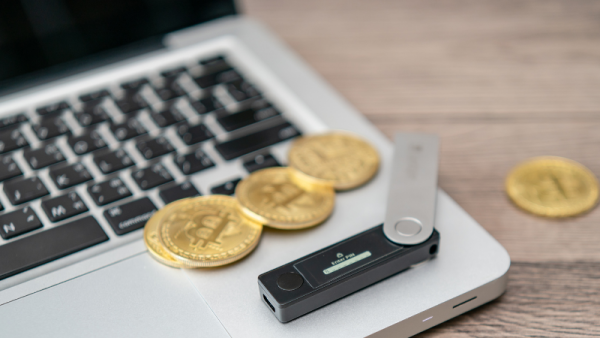How to Choose a Crypto Wallet?
When you get your first crypto, say, Bitcoin, you've got to figure out where to stash it. Think of a crypto wallet as a super-secure digital safe and an app that helps you handle crypto and digital stuff. But how do you choose a crypto wallet for your digital assets? In this article, we will discuss the key things to consider when picking the right crypto wallet for you.
Also, we will present a comparison chart of cryptocurrency wallet types, the pros and cons of crypto wallets, and some relevant information about how to store your digital assets safely.

Table of content
Key Highlights
- Security, private essential control, and supported cryptocurrencies are critical factors when choosing a crypto wallet.
- For enhanced security, prioritize wallets with robust encryption, secure login, and features like Two-Factor Authentication (2FA).
- Understand the distinction between hot (online) and cold (offline) wallets, each serving different needs for accessibility and security.
- Explore the advantages, including ownership control and global accessibility, and be aware of potential challenges like security risks and market volatility.
- Safeguard your private keys using offline storage, physical documentation, recovery options, and additional security layers.
Most Important Factors when Choosing a Crypto Wallet
As cryptocurrency experts, we want to highlight the most important factors when choosing a convenient, safe, and reliable cryptocurrency wallet:
- Security
- Private key control
- Two-factor authentication (2FA)
- Multisignature
- Backup and Recovery options
- Reviews and Reputation
- Ownership and Control
- Supported Cryptocurrencies
- Transaction fees
- Cross-platform compatibility
- Easy of Use
- Community and developer support
- Integration with Exchanges
Now, let's talk about all these factors in more detail.
Security
Ensuring the security of your crypto wallet is of utmost importance. Look for wallets prioritizing robust security features, such as advanced encryption and secure login processes, to safeguard your digital assets effectively.
Private Key Control
The private key is the gatekeeper to your digital holdings. Opting for a wallet that grants you complete control and ownership over your private keys is crucial, providing an added layer of security and autonomy.

Two-factor authentication (2FA)
Enhance the security of your wallet by choosing one that supports Two-Factor Authentication (2FA). This additional layer of verification adds an extra level of protection, making it more challenging for unauthorized access.
Multisignature
Consider wallets that offer multi-signature functionality. This feature distributes control among multiple private keys, requiring the consensus of several keys to authorize a transaction, thereby enhancing the security of your wallet.
Backup and Recovery Options
Prepare for unforeseen circumstances by selecting a wallet with reliable backup and recovery options. This ensures that you can regain access to your assets in case of device loss or failure, adding an essential layer of contingency.
Reviews and Reputation
Take the time to research and evaluate a wallet's reputation in the crypto community. Reading user reviews and considering the overall standing of the wallet will provide insights into its reliability and performance.
Ownership and Control

Maintain control over your digital assets by choosing a wallet that prioritizes user ownership. Opt for wallets that empower users to have complete control, reinforcing the security and autonomy of your crypto holdings.
Supported Cryptocurrencies
Ensure compatibility with your chosen digital assets. Look for wallets that support a diverse range of cryptocurrencies, allowing you the flexibility to manage various tokens within a single, comprehensive platform.
Transaction Fees
Consider the economic aspect of wallet usage. Be mindful of transaction fees associated with different wallets, selecting one that aligns with your budget and transaction frequency.
Cross-Platform Compatibility
Seamless integration across devices is essential for a smooth user experience. Choose a wallet with cross-platform compatibility, ensuring consistent functionality on your preferred devices and operating systems.
Ease of Use
User-friendly interfaces contribute significantly to the overall experience. Opt for wallets with intuitive designs and easy navigation, simplifying the management of your crypto assets, especially for users new to the cryptocurrency space.
Community and Developer Support
A vibrant community and active developer support indicate a wallet's reliability and ongoing development. Choose wallets with strong community engagement and responsive developer teams for a more supported and evolving user experience.
Integration with Exchanges
For those engaged in trading activities, consider wallets that seamlessly integrate with major cryptocurrency exchanges. This facilitates efficient transfers between your wallet and exchange accounts, streamlining your overall trading experience.

How to Choose a Wallet for Crypto by Wallet Type
The second thing when choosing a cryptocurrency wallet is knowing the various types of wallets available. As you know, there are two main types of crypto wallets – hot and cold.
Hot Wallets
Hot wallets are online wallets that are connected to the internet. They are accessible through various devices such as computers, smartphones, or tablets. Hot wallets are convenient for daily transactions and easy access to cryptocurrency funds. Examples include software wallets (mobile, desktop, and online wallets).
- Desktop Wallets
Description: Installed on a computer, desktop wallets offer increased security compared to online wallets. They are suitable for users who prefer to manage their funds on a specific device.
Advantages: Enhanced security control over private keys.
Examples: Exodus, Electrum.

- Mobile Wallets
Description: Mobile wallets are applications designed for smartphones, providing users with the flexibility to manage their cryptocurrencies on the go.
Advantages: Portability and convenience for mobile users.
Examples: Trust Wallet, Coinomi.
- Online Wallets
Description: Accessed through web browsers, these wallets are convenient for users who require regular access to their funds.
Advantages: Easy accessibility, suitable for users engaging in frequent transactions.
Examples: Coinbase, Blockchain.info.
Cold Wallets

Cold wallets are offline wallets designed to store private keys in an environment disconnected from the internet. Cold wallets provide enhanced security and are often used for long-term storage of significant amounts of cryptocurrency. They are less susceptible to online threats like hacking. Hardware wallets and paper wallets are common types of cold wallets.
- Hardware Wallets
Description: Hardware wallets are physical devices designed to store private keys offline. They are considered one of the most secure options for long-term storage.
Advantages: High-security protection against online threats.
Examples: Ledger Nano S, Trezor.
- Paper Wallets
Description: Paper wallets generate a physical document containing the user's public and private keys. They are considered a form of cold storage.
Advantages: Offline storage, secure for long-term holding.
Examples: Paper wallets generated via MyEtherWallet.
To make your decision easier, here's a comparison of the different types of crypto wallets and their security, accessibility, and use cases:
| Wallet Type | Accessibility | Security | Use Case | Examples |
| Software Wallets | Online, Desktop, Mobile | Varies (Dependent on Type) | Everyday transactions, convenience | Online: Coinbase Desktop: Exodus Mobile: Trust Wallet |
| Hardware Wallets | Physical device | High (Offline Storage) | Long-term storage, increased security | Ledger Nano S, Trezor |
| Paper Wallets | Physical document | High (Offline Storage) | Cold storage, secure for long-term holding | Generate via MyEtherWallet |
Note! Some wallets, known as universal wallets, support multiple cryptocurrencies. Check the wallet's specifications to ensure compatibility with your chosen digital assets.
Pros of Crypto Wallets
- Security. Many wallets prioritize advanced security features, such as encryption and private key management, providing a secure environment for storing digital assets.
- Ownership and Control. Users have direct ownership and control over their private keys, offering autonomy and reducing reliance on third-party entities.
- Decentralization: Crypto wallets align with the decentralized nature of cryptocurrencies, allowing users to transact without intermediaries like banks.
- Diverse Functionality: As you know wallets come in various types and offer users flexibility in choosing a solution that suits their preferences and needs.
- Access to New Features: Wallets often integrate new features and updates, enabling users to access the latest developments in the cryptocurrency space.
- Global Accessibility: Cryptocurrency wallets allow users to access their funds globally, overcoming geographical restrictions associated with traditional banking.

Cons of Crypto Wallets
- Security Risks: While security is a pro, there is also the risk of hacking or losing access to wallets, especially if users are not diligent about protecting their private keys.
- Learning Curve: For newcomers to the crypto space, understanding how to use and secure a wallet can take time and effort, leading to potential mistakes or oversights.
- Irreversible Transactions: Cryptocurrency transactions are irreversible, meaning they cannot be undone once a transaction is completed. This lack of recourse can be a disadvantage in accidental or fraudulent transactions.
- Market Volatility: The value of cryptocurrencies is highly volatile, and users may experience significant fluctuations in the value of their holdings.
- Lack of Regulation: The lack of regulatory oversight in the crypto space can lead to concerns about fraud, scams, and limited legal recourse in case of disputes.
- Limited Support Services: Compared to traditional financial institutions, crypto wallets may offer limited customer support services, making it challenging for users to resolve issues or recover lost assets.
Conclusions
Selecting the right crypto wallet is paramount in safeguarding your digital assets. Prioritize security features, understand the nuances of hot and cold wallets, and weigh the pros and cons. By adopting best practices for private key storage, you naturally fortify your control over your crypto holdings.
With these insights, embark on your crypto journey confidently, naturally equipped to navigate the dynamic landscape of digital finance. Discover the essentials of how to choose a wallet for crypto and ensure a secure and seamless experience in the realm of cryptocurrencies. For more information, check out our section on the best crypto wallets.
FAQ About How to Choose a Wallet for Crypto
⚡️ Are there different types of crypto wallets, and how do they differ?
Yes, there are hot wallets (online) and cold wallets (offline). Hot wallets are suitable for regular transactions, while cold wallets provide enhanced security for long-term storage.
⚡️ How to Choose a Crypto Wallet?
Key factors include security features, private essential control, ease of use, supported cryptocurrencies, transaction fees, and wallet reputation are the main factors when choosing a crypto wallet.
⚡️ Why is reputation so important when selecting a crypto wallet?
The reputation of a wallet reflects its reliability and performance. Check user reviews and community feedback to gauge the wallet's standing in the crypto community.
⚡️ What is the safest type of crypto wallet?
The safest crypto wallet combines a cold wallet for secure storage with integration into a hot wallet for convenient transactions. This ensures both safety and flexibility for managing crypto assets.
⚡️ What are the risks of crypto wallets?
Scams, phishing, and hacking pose risks to crypto wallets. Stay cautious of fraudulent websites and emails, and prioritize securing private keys.
⚡️ Can you lose crypto in a wallet?
Yes. Losing your private key means losing access to your crypto. The person with the private key has complete control. Securing private keys in a crypto wallet is crucial.
⚡️ How many wallets do I need for crypto?
For self-custody of your assets, having multiple crypto wallets is recommended. Begin with two: a hot wallet for frequent use and small amounts and a cold wallet for rare use and more significant amounts.



